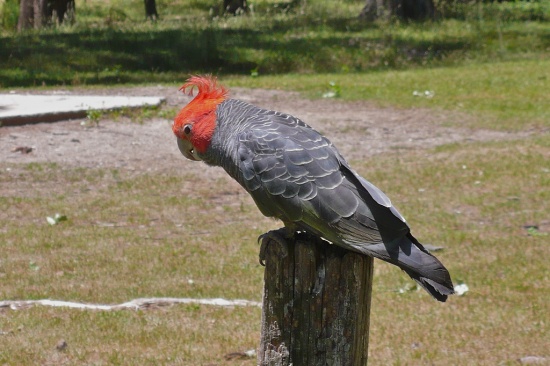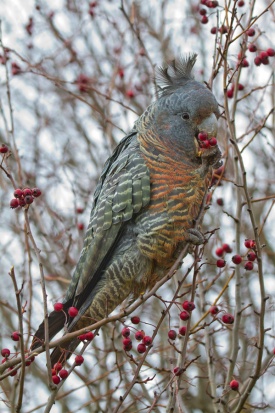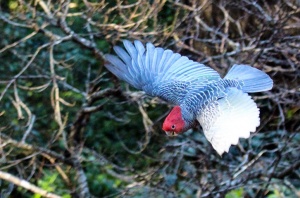m |
(Imp sizes. Clearer female image. C/right. Some extra info. References updated) |
||
| (9 intermediate revisions by 6 users not shown) | |||
| Line 1: | Line 1: | ||
| − | + | [[Image:G_G_Cockatoo.jpg|thumb|550px|right|Male<br />Photo © by {{user|nrg800|nrg800}}<br />Wombeyan Caves, [[New South Wales]], December 2009]] | |
| − | [[Image: | + | ;[[: Category:Callocephalon|Callocephalon]] fimbriatum |
| + | |||
==Identification== | ==Identification== | ||
| − | + | [[Image:IMG 6002pb.jpg|thumb|275px|right|Female<br />Photo © by {{user|Broc|Broc}}<br />Corangamite Lake Road, Victoria, June 2012]] | |
| + | 32–37 cm (12½-14½ in)<br /> | ||
| + | Male | ||
| + | *Grey overall plumage | ||
| + | *Orange-red head and crest | ||
| + | *White edging to upperparts feathers | ||
| + | *Yellow edges to underparts feathers<br /> | ||
| + | Females have a dark head and yellow spots | ||
| + | ==Distribution== | ||
| + | Coastal strip in south-east [[Australia]] ([[Victoria]], [[New South Wales]], and [[South Australia]]) | ||
| + | ==Taxonomy== | ||
| + | This is a [[Dictionary_M-O#M|monotypic]] species<sup>[[#References|[1]]]</sup>. | ||
| + | |||
| + | ==Habitat== | ||
| + | Woodland, often of the cooler and wetter variety. Suburban bushland. Wooded coastal plains. | ||
| + | ==Behaviour== | ||
| + | Often inconspicuous, hidden in foliage, and best discovered by the sounds of breaking seed capsules. | ||
| + | ====Diet==== | ||
| + | Their diet consists of a variety of seeds, fruits and berries from native treeds and shrubs. | ||
| + | ====Breeding==== | ||
| + | They usually nest close to water. They place the nest about 20m up in a hollow eucalypt tree. | ||
| + | ==References== | ||
| + | [[Image:Fast as light .jpg|thumb|300px|right|Photo © by {{user|shutterbug_07|shutterbug_07}}<br />Beecroft, [[New South Wales]], July 2013]] | ||
| + | #{{Ref-Clements6thAug18}}#Handbook of the Birds of the World Alive (retrieved December 2018) | ||
| + | #BF Member observations | ||
| + | {{ref}} | ||
==External Links== | ==External Links== | ||
| − | + | {{GSearch|Callocephalon+fimbriatum}} | |
| − | [[Category:Birds]] | + | |
| + | [[Category:Birds]][[Category:Callocephalon]] | ||
Latest revision as of 00:51, 18 December 2018
- Callocephalon fimbriatum
Identification
32–37 cm (12½-14½ in)
Male
- Grey overall plumage
- Orange-red head and crest
- White edging to upperparts feathers
- Yellow edges to underparts feathers
Females have a dark head and yellow spots
Distribution
Coastal strip in south-east Australia (Victoria, New South Wales, and South Australia)
Taxonomy
This is a monotypic species[1].
Habitat
Woodland, often of the cooler and wetter variety. Suburban bushland. Wooded coastal plains.
Behaviour
Often inconspicuous, hidden in foliage, and best discovered by the sounds of breaking seed capsules.
Diet
Their diet consists of a variety of seeds, fruits and berries from native treeds and shrubs.
Breeding
They usually nest close to water. They place the nest about 20m up in a hollow eucalypt tree.
References
- Clements, J. F., T. S. Schulenberg, M. J. Iliff, D. Roberson, T. A. Fredericks, B. L. Sullivan, and C. L. Wood. 2018. The eBird/Clements checklist of birds of the world: v2018. Downloaded from http://www.birds.cornell.edu/clementschecklist/download/
- Handbook of the Birds of the World Alive (retrieved December 2018)
- BF Member observations
Recommended Citation
- BirdForum Opus contributors. (2024) Gang-gang Cockatoo. In: BirdForum, the forum for wild birds and birding. Retrieved 9 May 2024 from https://www.birdforum.net/opus/Gang-gang_Cockatoo






